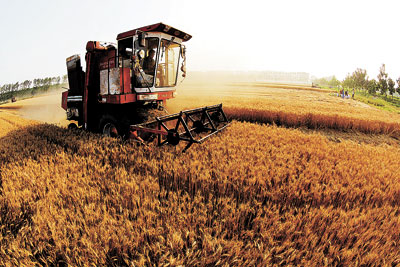
THE government wants to give the market a bigger role in setting farm prices and move away from a controversial State stockpiling policy that has led to bulging grain inventories and a surge of cheap imports, a top agricultural official said Tuesday.
That policy, in which grains are bought at artificially high prices in order to boost rural incomes, has encouraged farmers to produce too much, and China should rely on market signals to enable output to match demand, said Chen Xiwen, who heads the Party’s rural policy group.
“We will draw on our experience from the introduction of target prices for soy and cotton ..., let the market play a leading role in the formation of prices and give correct market information to farmers, so they can produce based on the needs of the market,” Chen told a news briefing.
Last year the government scrapped its cotton and soybean stockpile schemes, switching to direct subsidies to farmers to cover the gap between a target price and the market price, but it kept the stockpile policy for grains, sugar and rapeseed.
The system has driven domestic prices to artificially high levels, with corn about 40 percent higher than on the global market. Downstream industries have been shifting to cheap imports, leaving the expensive domestic crop to the State reserve.
Sinograin, the State stockpiler, purchased a record 125 million tons of grain in 2014, the Xinhua news agency said Monday.
Analysts estimated the country’s corn stocks could reach more than 120 million tons in 2014/15 after three years of bumper purchases.
“It’s a big problem where we should store new purchases this year because the silos in some areas are already full,” Chen said.
He said the government would continue to impose strict controls on imports of grain, cotton and sugar in order to ease the oversupply.
Last October, Vice Premier Wang Yang said the country would seek to control imports and crack down on smuggling in a bid to cut oversupply, with record stockpiles leading to rising storage problems.
The world’s top cotton-consuming country will slash cotton import quotas for 2015 to boost demand for domestic fiber, a government official said last year.
China will also try to control sugar imports by requiring buyers to register shipments in excess of quotas, allowing it to monitor the flow of cheap imports more closely.
Shipments delivered in excess of quotas agreed with the World Trade Organization should attract higher tariffs, but local authorities have not been implementing the rules strictly enough, Chen said.(SD-Agencies)
|

